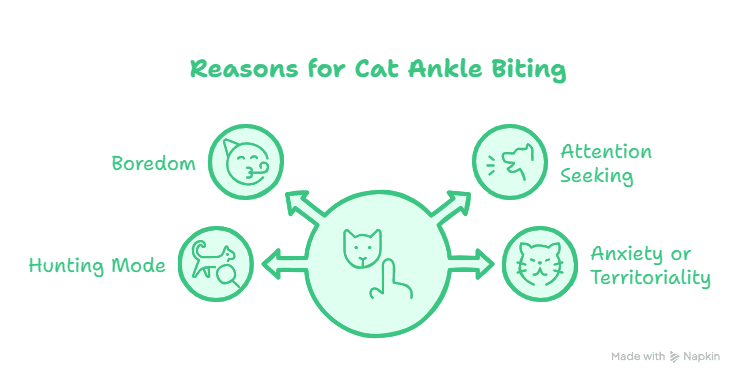
Introduction
You’re walking through the house, minding your business, when suddenly, ouch! Your cat has lunged and latched onto your ankle like you’re prey. It’s fast, unpredictable, and if we’re being honest… a little bit rude.
So, why does my cat bite my ankles when I walk? You’re not alone in asking. It’s a surprisingly common behavior, and while it may seem aggressive, it usually has more to do with instinct, energy, and attention than anything malicious. Let’s dive into why cats do this and how to stop it—before your ankles become their favorite chew toy.
Understanding Feline Hunting Instincts
First, it helps to understand one thing: your cat is a natural-born predator.
Even if they’re pampered and spoiled indoors, cats retain strong hunting instincts. Moving ankles are:
– Fast-moving like prey
– Low to the ground, easily in reach
– Inconsistent in movement, triggering a stalking reflex
When you walk by, especially if your cat is in a playful or bored mood, your legs may as well be a squeaky mouse.
Play vs. Aggression: What’s the Difference?
Not all ankle attacks are the same. Some cats are just having fun. Others may be feeling defensive or irritated. Here’s how to tell:
Playful Biting:
– Soft or moderate pressure
– No hissing, growling, or arched back
– Quick “attack and retreat” behavior
– Often happens during high-energy moments (like “zoomies”)
Aggressive Biting:
– Hard bites that leave marks or draw blood
– Hissing, growling, ears pinned back
– Stalking posture or dilated pupils
– Continues to bite even when you try to move away
Most ankle-biting falls into the playful category, but it’s still something you’ll want to redirect.
Why Your Cat Might Be Biting Your Ankles

1. They’re Bored or Under-Stimulated
Cats, especially indoor ones, need stimulation. Without enough playtime or enrichment, they’ll find other ways to entertain themselves—and unfortunately, that sometimes means turning your ankles into a moving target.
2. They’re Trying to Get Your Attention
Have you noticed your cat tends to do it when you’re ignoring them? Maybe you’re walking away from the food area, or they want playtime. Ankle biting can become a learned behavior if it gets a reaction out of you.
3. They’re in Hunting Mode
This is common in younger cats and high-energy breeds like Bengals or Abyssinians. You moving quickly can flip the hunting switch in their brain, turning you into a target.
4. They’re Feeling Anxious or Territorial
Less common, but possible. Cats that are overstimulated or stressed may lash out at the nearest moving object. If ankle biting is accompanied by other behavioral issues, anxiety might be the underlying cause.
Kitten vs. Adult Cat: Does Age Matter?
Yes!
– Kittens are more likely to bite as a form of play or teething. Their world is a toy box, and you’re part of it.
– Adult cats may bite out of frustration, boredom, or habit—especially if it’s been unintentionally reinforced.
The older your cat gets, the more important it becomes to redirect biting behavior before it sticks for life.
How to Stop Your Cat From Biting Your Ankles
✅ 1. Increase Playtime
Use wand toys, laser pointers, or feather chasers to tire them out. A bored cat is a bitey cat.
✅ 2. Redirect the Energy
If they start stalking you, toss a small toy or distract them with a quick game.
✅ 3. Don’t React Dramatically
Yelling or chasing may actually excite them more. Instead, stop walking, say a firm “no,” and walk away calmly.
✅ 4. Avoid Reinforcement
Don’t give treats, affection, or laughs right after the bite—this may accidentally reward the behavior.
✅ 5. Offer Enrichment
Cat trees, window perches, puzzle feeders, and rotating toys help keep their minds active and paws busy.
When Should You Be Concerned?
Occasional ankle bites are normal. But if your cat is:
– Biting hard or drawing blood
– Growling or hissing frequently
– Seeming anxious, stressed, or aggressive in other situations
…it’s time to consult your vet or a feline behaviorist. Underlying pain, frustration, or even a neurological issue could be at play.
Training Tips to Reduce Ankle Attacks
– Use clicker training to reward calm, non-biting behavior.
– Teach a command like “leave it” or “no bite” during play.
– Keep a toy in your pocket to toss when you sense an ambush coming.
– Be consistent—every family member should respond the same way.
The key is not just stopping the bite, but replacing it with a better outlet.
FAQs
Why does my cat only bite my ankles and not anyone else’s?
You may be the most interactive person in their life, or the one they associate with playtime. Cats often target the person they feel most bonded (or playful) with.
Is ankle biting a sign of affection?
Sometimes! If it’s gentle and your cat seems relaxed, it may be a weird form of attention-seeking or play. But affection shouldn’t hurt, so redirection is still important.
Will my cat grow out of this behavior?
Kittens often do with proper play and training. Adult cats may need more effort and consistency, but most can be trained to stop ankle biting over time.
Also Read - Why Does My Cat Stare at the Ceiling? 5 Fascinating Reasons Explained
Conclusion
So, why does my cat bite my ankles when I walk? The answer usually comes down to play, boredom, or attention-seeking, not aggression. Your moving feet trigger their inner hunter—or maybe they just want you to stop and play.
By increasing playtime, redirecting energy, and staying calm, you can teach your cat that your ankles are off-limits. And hey, your feet will thank you.




